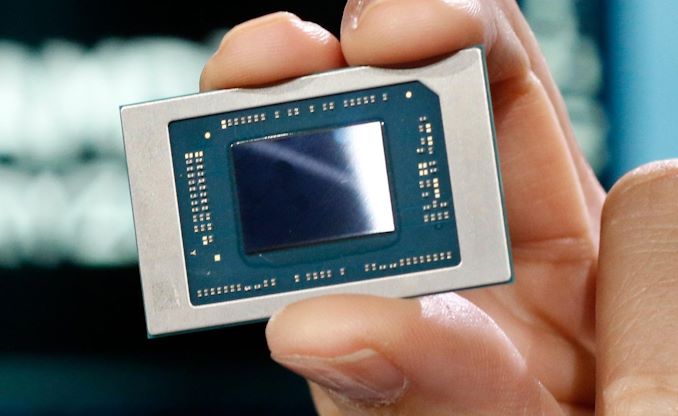AMD: Ryzen Mobile 7040HS “Phoenix” Laptops Delayed Until April
by Ryan Smith on March 17, 2023 4:05 PM EST
For everyone who has been eagerly waiting for the first laptops incorporating AMD’s monolithic Zen 4 mobile CPU, AMD sends word on a Friday afternoon that you’ll be waiting a little longer. Laptops based on AMD’s Ryzen Mobile 7040HS series CPUs have officially been delayed by a month, pushing their expected availability from March to April.
First detailed during AMD’s CES 2023 keynote, the Ryzen Mobile 7040HS series (codename Phoenix) is AMD’s first mobile-focused, monolithic die CPUs based on the Zen 4 architecture, and will be their flagship silicon for mobile devices for 2023. Besides incorporating AMD’s latest CPU architecture, Phoenix also adds into the mix an updated RDNA3 architecture iGPU, and for the first time in any AMD CPU, a dedicated AI processing block, which AMD has aptly named the Ryzen AI. All of which, in turn, is fabbed using TSMC’s 4nm process – making it the single most advanced piece of silicon out of AMD yet.
At the time of its announcement, laptops based on Phoenix were expected in March of this year (i.e. this month). However AMD has sent over a brief announcement on a sleepy Friday afternoon stating that devices based on the new chips have been pushed back a month, to April, citing “platform readiness.” AMD’s complete announcement is below:
To align with platform readiness and ensure the best possible user experience, we now expect our OEM partners to launch the first notebooks powered by Ryzen 7040HS Series processors in April.
Source: AMD PR











57 Comments
View All Comments
mode_13h - Sunday, March 19, 2023 - link
> Van Gogh was an anomaly that OEMs rejectedThey would have rejected it for very good reasons. It's Zen 2-based and TSMC N7, but AMD launched Rembrandt with Zen 3+ and RDNA2 on N6, around then. At the bottom of the market, AMD's existing N7 Zen 2 APUs with a Vega iGPU were fine, so no demand there. In the mid-market and above, Rembrandt was all-around better. Van Gogh was a weird chip.
BTW, I thought Van Gogh was custom-made under contract, similar to what AMD built for the big consoles. Do you know otherwise? Or were you just assuming AMD had it all done and Valve just ordered it as-is?
brucethemoose - Tuesday, March 21, 2023 - link
Van Gogh was on a leaked AMD laptop roadmap as a 2021 9W laptop APU. It is in line with Cezzane, and a predecessor to Dragon Crest.I dont think I can post the link, but search for "Van Gogh Videocardz"
The "OEMs rejecting it" is speculation on my part. But I have always been skeptical of the Deck APU being "custom made," as Valve does not have the volume to justify that.
mode_13h - Thursday, March 23, 2023 - link
You can post links here. As long as they're in context, I think it's find.mode_13h - Thursday, March 23, 2023 - link
^fine.> I have always been skeptical of the Deck APU being "custom made,"
> as Valve does not have the volume to justify that.
What runs counter to this were the rumors about various specs changes, such as a 256-bit memory interface, at one point.
mode_13h - Sunday, March 19, 2023 - link
Plus, Van Gogh required (then) expensive LPDDR5, which is another thing that made it inappropriate for entry-level notebooks.brucethemoose - Saturday, March 18, 2023 - link
I am quite excited about the Ryzen AI thing.Right now, the only way to run big GPT-like models locally is to run a 32GB+ Mac, which costs as much as a car. Even on desktops, splitting the models between 3090s or 4090s isn't quite working yet. But a 64GB Asus G14 or whatever could be (theoretically) affordable, especially if bits of the project can run on an RTX 4060 or whatever.
lemurbutton - Sunday, March 19, 2023 - link
It's going to run extremely slow on this Ryzen NPU. The reason is because Apple Silicon use the GPU and its unified memory VRAM to run large models. The Ryzen NPU will still have access to very slow DRAM since Ryzen APUs do not support unified memory.mode_13h - Sunday, March 19, 2023 - link
> Ryzen APUs do not support unified memory.What do you even mean by that? I'm sure they do.
The elephant in the room is memory bandwidth, where Apple uses up to 512-bit (M1 Max) or 1024-bit (M1 Ultra) LPDDR5 to provide enough bandwidth for decent GPU performance.
brucethemoose - Tuesday, March 21, 2023 - link
@mode_13h The regular M1 and M2 still perform well, with the NPU being far more power efficient than the GPU. And anyway, speed isnt a factor as much as "does the model even fit into the accelerator's RAM."Lemur may actually be right. We shall see how AMD has their Phoenix accelerator set up, but the Rembrandt IGP (for instance) is not precisely unified memory.
mode_13h - Thursday, March 23, 2023 - link
Doesn't matter how good the NPU is, performance on larger models will be bottlenecked by memory bandwidth. That's a fact.To inference, you typically have to read in the *entire* model from memory per iteration. Do the math.